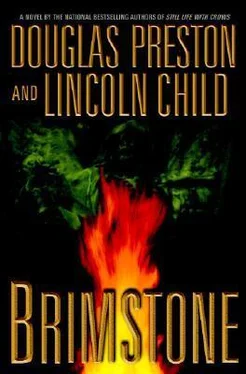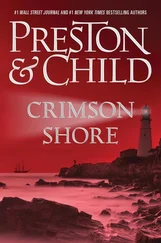Douglas Preston - Brimstone
Здесь есть возможность читать онлайн «Douglas Preston - Brimstone» весь текст электронной книги совершенно бесплатно (целиком полную версию без сокращений). В некоторых случаях можно слушать аудио, скачать через торрент в формате fb2 и присутствует краткое содержание. Жанр: Триллер, на английском языке. Описание произведения, (предисловие) а так же отзывы посетителей доступны на портале библиотеки ЛибКат.
- Название:Brimstone
- Автор:
- Жанр:
- Год:неизвестен
- ISBN:нет данных
- Рейтинг книги:5 / 5. Голосов: 1
-
Избранное:Добавить в избранное
- Отзывы:
-
Ваша оценка:
- 100
- 1
- 2
- 3
- 4
- 5
Brimstone: краткое содержание, описание и аннотация
Предлагаем к чтению аннотацию, описание, краткое содержание или предисловие (зависит от того, что написал сам автор книги «Brimstone»). Если вы не нашли необходимую информацию о книге — напишите в комментариях, мы постараемся отыскать её.
Brimstone — читать онлайн бесплатно полную книгу (весь текст) целиком
Ниже представлен текст книги, разбитый по страницам. Система сохранения места последней прочитанной страницы, позволяет с удобством читать онлайн бесплатно книгу «Brimstone», без необходимости каждый раз заново искать на чём Вы остановились. Поставьте закладку, и сможете в любой момент перейти на страницу, на которой закончили чтение.
Интервал:
Закладка:
"You gotta be kidding."
"The Bureau was called in immediately, and their documentation was impeccable," said Pendergast. "Photographs, tests, analysis-it ran to more than a thousand pages. Our experts determined that a temperature of at least three thousand degrees would be necessary to cremate a body that thoroughly. A cigarette igniting her clothing would never have produced that temperature, and besides, Mary Reeser didn't smoke. There were no traces of gasoline or other accelerants. No short circuit. Even lightning was ruled out. The case was never officially closed."
D'Agosta shook his head in disbelief.
"And it's not just a recent phenomenon," Constance said. "Dickens wrote an account of spontaneous combustion into his novel Bleak House . He was roundly criticized by reviewers for it, so he later defended himself by recounting a real case of SHC in the preface to the 1853 edition."
D'Agosta, who had been about to take another bite of steak, put down his fork.
"On the evening of April 4, 1731, Dickens tells us, the countess Cornelia Zangari de' Bandi of Cesena, in Italy, complained of feeling 'dull and heavy.' A maid helped her to bed, and they spent several hours praying and talking together. The next morning, when the countess did not arise at her usual time, the maid called at the door. There was no answer-just a foul smell.
"The maid opened the door to a scene of horror. The air was full of bits of floating soot. The countess, or what remained of her, was lying on the stone floor about four feet from the bed. Her entire torso had burned to ashes, even the bones reduced to crumbled piles. Only her legs remained, from the knees down; a few fragments from her hands; and a piece of forehead with a lock of blonde hair attached. The rest of the body was merely an outline in ash and crumbled bone. It, and other early cases such as Madame Nicole of Rheims, were invariably ascribed to death by the 'visitation of God.'"
"Excellent research, Constance," Pendergast said.
She smiled. "There are several volumes devoted to spontaneous human combustion in the library here. Your great-uncle was fascinated by bizarre forms of death-but of course, you know that already. Unfortunately there are no books here more recent than 1954, but there are still many dozens of earlier accounts. SHC cases all have several elements in common. The torso is completely incinerated, but the extremities are frequently left intact. The blood is, quite literally, vaporized from the body: normal fires do not dehydrate body tissue to such a great degree. The inferno is extremely localized: nearby furniture or other items, even inflammable ones, remain untouched. Officials often speak of a 'circle of death': everything inside is consumed, while everything outside is spared."
Slowly, D'Agosta pushed away his half-eaten steak. This all sounded pretty similar to what happened to Grove and Cutforth, with one crucial difference: the branding of the cloven hoof and face, and the stench of brimstone.
Just then came a low, hollow knock at the distant front door.
"Neighborhood kids, I imagine," said Pendergast after a moment of silence.
The hollow knock came again-deliberate, insistent, echoing through the galleries and halls of the ancient mansion.
"That's not the knock of a delinquent," Constance murmured.
Proctor cast an inquiring glace at Pendergast. "Shall I?"
"With the usual precautions."
Within the space of a minute, the servant had ushered a man into the room: a tall man with thin lips and thinner brown hair. He wore a gray suit, and the knot of his tie had been pulled down from the collar of his white shirt. His features were regular, his face perhaps lined more than would be usual for a man his age, yet the lines spoke more of weariness than years. He was neither handsome nor ugly. In every way, the man was remarkable for his lack of expression and individuality. It seemed to D'Agosta an almost studied anonymity.
He paused in the doorway and his eyes roamed over the group, coming to rest on Pendergast.
"Yes?" Pendergast said.
"Come with me."
"May I ask who you are, and on what errand you come?"
"No."
A short silence greeted this.
"How did you know I lived here?"
The man continued gazing at Pendergast with that expressionless face. It wasn't natural. It gave D'Agosta the creeps.
"Come, please. I'd rather not ask again."
"Why should I go with you if you refuse to divulge your name or the nature of your business?"
"My name is not important. I have information for you. Information of a sensitive nature."
Pendergast looked at the man a moment longer. Then he casually removed his Les Baer .45 from his suit coat, made sure a round was in the chamber, replaced it in his suit. "Any objections?"
The expression never changed. "Won't make any difference either way."
"Wait a minute." D'Agosta rose. "I don't like this. I'm coming, too."
The man turned to him. "Not possible."
"Screw that."
The man's only response was to stare at D'Agosta. His features, if anything, grew even deader.
Pendergast laid an arm on D'Agosta's. "I think I'd better go alone."
"The hell with that. You don't know who this guy is, what he wants, anything. I don't like it."
The stranger turned and walked swiftly out of the room. A moment later, Pendergast followed. D'Agosta watched him go with a mounting feeling of dismay.
{ 31 }
The man drove north on the West Side Highway, saying nothing, and Pendergast was content to leave it that way. Rain began to fall, splattering the windshield. The car approached the on-ramp to the George Washington Bridge, its gleaming lights strung across the Hudson. Just before the ramp, the car veered off on a service road and bumped its way down the pitted, half-paved surface to a turnaround, hidden in a cluster of poison sumac at the foot of the bridge's enormous eastern tower.
Only now did the man speak. "Wired?"
"No."
"I ask only for your sake."
"CIA?"
The man nodded at the windshield. "I know you could ID me in a minute. I want your word that you won't."
"You have it."
The man tossed a blue folder into Pendergast's lap. Its label tab bore a single word: BULLARD. It was stamped Classified: Top Secret.
"Where did this come from?" Pendergast asked.
"I've been investigating Bullard for the past eighteen months."
"On what grounds?"
"It's all there. But I'll summarize it for you. Bullard's the founder, CEO, and majority shareholder of Bullard Aerospace Industries. BAI is a medium-sized, privately owned aerospace engineering firm. Mostly they design and test components for military aircraft, drones, and missiles. They're also one of the subcontractors for the space shuttle. Among other things, BAI was involved in developing the antiradar coating for the stealth bomber and fighter programs. It's a highly profitable company, and they're very good at what they do. Bullard has some of the best engineers money can buy. He is a very, very capable man, if hot-tempered and impulsive. But he's one of the really bad ones. Know what I mean? He doesn't hesitate to hurt, or eliminate, those who stand in his way. Civilian or official."
"Understood."
"Good. Now listen. BAI also does research work for foreign governments. Some aren't so friendly. That work is subject to strict export controls and transfer of technology prohibitions. It's watched very closely. So far, BAI has kept within the law-at least as far as its U.S. facilities go. The problem is with a small BAI plant in Italy, in an industrial suburb of Florence called Lastra a Signa. A few years ago, BAI bought a defunct factory there. It was once owned by Alfred Nobel." An ironic smile flickered across the man's face. "It's a sprawling, decaying place. They've turned its core into a highly sophisticated R&D facility."
Читать дальшеИнтервал:
Закладка:
Похожие книги на «Brimstone»
Представляем Вашему вниманию похожие книги на «Brimstone» списком для выбора. Мы отобрали схожую по названию и смыслу литературу в надежде предоставить читателям больше вариантов отыскать новые, интересные, ещё непрочитанные произведения.
Обсуждение, отзывы о книге «Brimstone» и просто собственные мнения читателей. Оставьте ваши комментарии, напишите, что Вы думаете о произведении, его смысле или главных героях. Укажите что конкретно понравилось, а что нет, и почему Вы так считаете.












